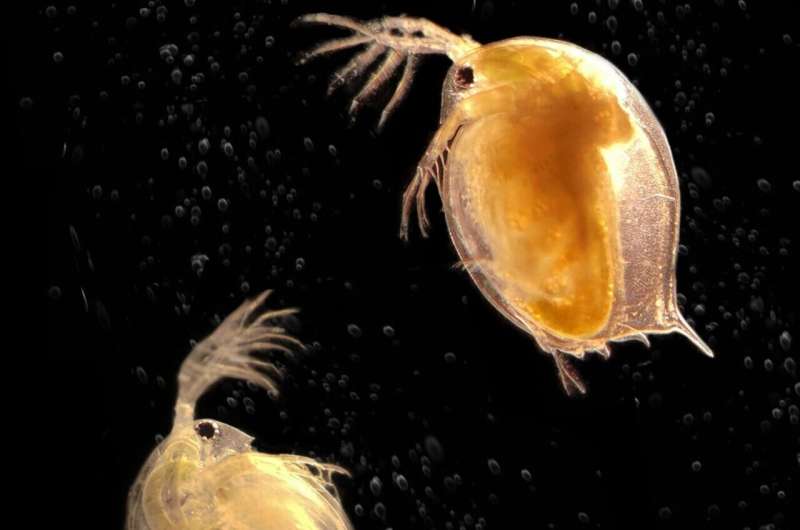This article has been reviewed according to Science X's editorial process and policies. Editors have highlighted the following attributes while ensuring the content's credibility:
fact-checked
peer-reviewed publication
trusted source
proofread
Parasites can have a positive effect on biodiversity and can play a crucial role in maintaining it

A new study by Tel Aviv University reveals that the presence of parasites in nature is not necessarily negative, and sometimes even helps animals survive. The team of researchers explain: "Thinking about parasites usually brings up negative connotations, such as, 'do they harm their host'? Or 'how harmful are they to those who carry them'? In our research, we showed that parasites can in fact have a positive effect on the structure of an ecosystem, and that they can play a key role in the design of the habitat and in sustaining its biological diversity."
The research was conducted under the leadership of Prof. Frida Ben-Ami and Dr. Sigal Orlansky from the School of Zoology and the Steinhardt Museum of Natural History, Tel Aviv University. The study was published in the journal Frontiers in Microbiology.
The researchers explain that in a healthy ecosystem, there is usually a wide variety of species living side by side. Related species are able to exist in the same habitat provided that they influence and are influenced differently by natural resources and predators. Without proper separation and balance between those species, they cannot coexist—one of the species will be driven to extinction by the other. This principle is termed the 'competitive exclusion principle,' also known as Gause's law.
Dr. Sigal Orlansky adds, "Parasites and pathogens are an integral part of any ecosystem. Despite their bad reputation, parasites play a key role in shaping population dynamics, community structure, and biodiversity, thanks to their influence on the balance between the species in that ecosystem."
The research was conducted on tiny Daphnia water fleas, which in Israel can be found mainly in winter ponds. Daphnia fleas are about three millimeters in length, feed on single-celled algae and bacteria and themselves serve as food for fish. Since winter pools are closed habitats, the competition between different species is particularly significant in its effect on the biological diversity in the pool.
Aquatic species that live in the winter ponds cannot leave or migrate elsewhere independently, so the results of the competition are crucial to their survival. Like most animals, these species are also hosts or carriers of parasites and it is rare to find a species that is almost completely resistant to parasites.
According to Prof. Ben-Ami, "In the population of water fleas in Israel, we found one species called Daphnia similis, whose nickname in the laboratory is 'Super Daphnia' due to its almost complete resistance to parasites. Nevertheless, this 'Super Daphnia' does not become the dominant Daphnia species in ponds. The most common species is actually Daphnia magna, which is highly vulnerable to a wide variety of parasites."
To understand why immunological immunity does not constitute a springboard for wide distribution in the pond, the researchers have set up a biological microcosm in the laboratory, in which the two species shared the same habitat in the presence or absence of parasites. The results showed that in a parasite-free habitat, the parasite-sensitive species, which is the most common Daphnia species in the wild, is the one that won the competition, even forcing the disappearance of the parasite-resistant 'Super Daphnia'.
However, in habitats with parasites, the survival of the parasite -sensitive Daphnia decreased dramatically and the 'Super Daphnia' population became established, demonstrating an environment where coexistence between the two species is possible via the mediation of parasites.
Dr. Sigal Orlansky says that "The results of these experiments emphasize the important role of parasites in shaping biodiversity, as the parasites can mediate competition between Daphnia species."
"This competition enables the coexistence of a species that is indeed resistant to parasites, but its ability to compete is lacking and without parasites would probably become extinct when it shares the same habitat with the Daphnia species most common in Israel, the Daphnia magna, which while sensitive to parasites is otherwise strongly competitive. Our research shows that coexistence of these two Daphnia species is only possible through the mediation of a parasite."
Prof. Ben Ami emphasizes that the results of these experiments have significant implications for obtaining a better understanding of systems in which both sensitive to parasites and less sensitive species to parasites co-exist. These results may help guide efforts in dealing with biological invasions and even help reduce the threat to endangered species.
More information: Sigal Orlansky et al, The parasites of my rival are my friends, Frontiers in Microbiology (2023). DOI: 10.3389/fmicb.2023.1135252
Journal information: Frontiers in Microbiology
Provided by Tel-Aviv University





















